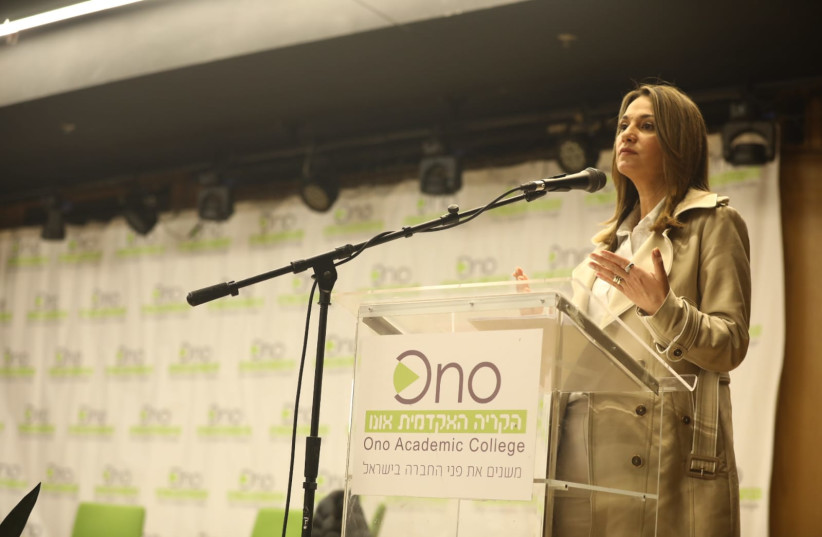There were no Israelis among the 11 recipients of the 2022 Wolf Prize, awarded annually to outstanding figures in the arts and sciences.
The names of the laureates were disclosed on Tuesday at a festive event held in the President’s Residence, where the prize winners are traditionally announced. This year’s laureates reside in five countries: the United States, Canada, Germany, Sweden and Japan.
There were apparently no Israelis among the approximately 100 contestants working in the fields of chemistry, physics, mathematics and architecture, whose achievements to date could measure up to those selected by the jury of the International Wolf Foundation.
The Wolf Prize is considered to be so important that it was broadcast live at 17:00 Israel time on a big screen at the President’s Residence, and could be seen in Central Europe at 16:00 and at 10:00 EST.
Education Minister Dr. Yifat Shasha-Biton, who is also chair of the Wolf Foundation International Council’s Board of Trustees, said that it was a day of celebration for the State of Israel and around the world. She said that Wolf Prize laureates had revolutionized the world of science, “and changed our lives” through their achievements that have contributed to humankind.

Laureates have come from all parts of the world, she noted, and have helped to form more connections for Israel. Most are affiliated with universities or with other institutes of higher learning.
To Shasha-Biton, the essential factor is education, without which none of the laureates would have been able to accomplish what they have achieved.
“Our future is in education,” she declared, emphasizing that it is the key to equal opportunity and realization of potential.
Nobel, Israel and Wolf Prize laureate Prof. Dan Shechtman, acting chairman of the Wolf Foundation Council, said that being awarded the Wolf Prize is the culmination of a long journey that includes quite a few difficulties, and not infrequently, a sense of disappointment often in isolation, as he knows from his own experience.
It takes time for new ideas and inventions to be recognized, he said, and this can be a period of frustration, hope, persistence, determination and dedication.
“Without the Wolf Prize, science would not be where it is today,” said the world-renowned scientist. The laureates, said Shechtman, “are the best of the best.”
Although there were 11 laureates, there were only five $100,000 prizes, because there was more than one winner in some categories.
Prof. Pamela C. Ronald of the University of California, Davis, was awarded the prize in Agriculture “for pioneering work on disease resistance and environmental stress tolerance in rice.” She is noted for her work in enhancing sustainable food security.
The Chemistry prize was awarded to professors Bonnie L. Basler of Princeton University, Carolyn R. Bartucci of Stanford University and Benjamin F. Cravatt III of the Scripps Institute, “for their seminal contributions to understanding the chemistry of cellular communication and inventing chemical methodologies to study the role of carbohydrates, lipids and proteins in such biological processes.”
Prof. George Lusztig, of the Massachusetts Institute of Technology, was awarded the prize in Mathematics “for groundbreaking contributions to representation theory and related areas.” He was described as “one of the greatest mathematicians of our times.”
PHYSICS RECIPIENTS are professors Anne L’Huillier, University of Lund, Sweden; Paul Corkum, University of Ottawa; and Ferenc Krausz, Max Planck Institute for Quantum Optics and Ludwig Maximilian University in Munich – “for pioneering contributions to ultrafast laser science and attosecond physics.”
The Wolf Prize in Architecture was awarded to three architects: Prof. Elizabeth Diller, Princeton University, “for her exceptional and influential work connecting architecture to artistic practice, engaged in the public domain”; Prof. Momoyo Kaijima, Atelier Bow-Wow, Zurich Institute of Technology; and Prof. Yoshiharu Tsukamoto, Atelier Bow-Wow, Tokyo Institute of Technology, Japan – “for their work that highlights the importance to architecture of its ethnographic and in habitational characteristics, in their writings and practice.”
Shasha-Biton presented President Isaac Herzog with a file detailing the rationale behind the selection of each of the laureates.
“We must take the given reality of our world not as an intractable truth, but as a starting point for realizing our own visions,” Herzog said. “There is a universal human impulse to become masters of our destiny, to push the boundaries of our imagination, and remake the world in the image of our wishes for ourselves and our children. For me, this is the essence of Israel’s story and also the story of our evolving world.”
Relating to the 11 recipients who represent a broad range of fields, interests and contributions, Herzog said that each demonstrates the exquisite qualities of intellect, curiosity, creativity and dialogue that have driven humanity forward. “Each of these laureates is a remarkable living testament to human ingenuity, which is constantly redefining the boundaries of what is really possible.”
The president recalled that he had also had the pleasure of meeting the late Dr. Ricardo Wolf, a diplomat, inventor and philanthropist who established the prize 44 years ago. Wolf had served as ambassador of Cuba to Israel from 1960 to 1973, the year in which Cuba severed relations with the Jewish state.
The Wolf Prize award ceremony is traditionally held in the Chagall Hall of the Knesset with the participation of the president of Israel. A date for the ceremony has yet to be announced.
